2012 Ernest Scott Prize Shortlist Announced
The following publications have been shortlisted for the 2012 Ernest Scott Prize. The Ernest Scott Prize is awarded to work based upon original research which is, in the opinion of the examiners, the most distinguished contribution to the history of Australia or New Zealand or to the history of colonisation.
The prize is worth over $12000.
The judges this year are Professor Marilyn Lake and Professor Tony Ballantyne.

Hilary Carey, God’s Empire: Religion and Colonialism in the British World, c. 1801-1908 (Cambridge University Press)Citation:
God’s Empire reminds us that religion was an important foundation of the idea of ‘Greater Britain’ and that Christianity was central to both the dynamic of building the new settler colonies of Australia, Canada and New Zealand and the often fierce debates over the meaning and ends of empire. Hilary Carey’s monograph offers a rich reappraisal of the role of Christian churches – Anglicans, Catholics, Evangelical Anglicans, Nonconformists and Presbyterians – in shaping colonial political culture and institutional life. With its geographic range, and close attention to local contexts, God’s Empire is an important work, both scholarly in its approach and provocative in argument.

Charlotte Macdonald, Strong, Beautiful and Modern: National Fitness in Britain, New Zealand, Australia and Canada, 1935-1960 (Bridget Williams Books)Citation:
Charlotte Macdonald’s Strong, Beautiful and Modern is a compelling history of modernity’s preoccupation with bodily improvement. In exploring the development of ‘national fitness’ in Britain, Australasia and Canada from the mid-1930s through to 1960s, she demonstrates the convergence between governmental concern with bodily well-being and growing commercial, medical and popular investment in the pursuit of ‘better bodies’. Balancing an impressive breadth of scholarly vision with deft readings of particular contexts, Macdonald also offers readers rich insights into the gendered dynamics of the modern preoccupation with fitness and bodily perfectibility.

Mark McKenna, An Eye for Eternity: The life of Manning Clark (Melbourne University Press)Citation:
An Eye for Eternity combines an arresting biography of Australian historian Manning Clark and an eloquent meditation on the writing and reception of his idiosyncratic histories. Drawing on a rich range of sources including diaries and other personal papers, interviews, archival materials and printed works, Mark McKenna’s approach to interpreting the past is rather more scholarly than that of his subject, and more clear-sighted. In portrayingClark as husband, father, teacher, friend, traveller, writer and national prophet, McKenna shows us a self-centred and self-pitying man, who felt more kinship with artists such as Sidney Nolan and Patrick White than with fellow academics who chided him for factual inaccuracy.

Damon Ieremia Salesa, Racial Crossings: Race, Intermarriage, and the Victorian British Empire (Oxford Historical Monographs)Citation:
Damon Salesa’s Racial Crossings: Race, Intermarriage, and the Victorian British Empire is a landmark contribution to the scholarship on race and racial boundaries within modern imperial regimes. While he carefully explores imperial anxieties about the permeability of racial boundaries, Salesa also recovers the largely neglected story of those metropolitan observers, colonial officials and intellectuals, missionaries, humanitarians and indigenous leaders who stressed the progressive and productive potential of ‘racial crossings’. Marshalling meticulous archival work as well as a masterful set of historiographical reflections, Salesa offers a fundamental reassessment of racial thought and state practice within the Victorian empire.

Elegantly written and innovative in focus, Frances Steel’s Oceania Under Steam offers a compelling cultural history of the ‘age of steam’ in the southern Pacific. Peopled with a diverse array of historical actors – from common seamen to saloon class passengers, from stewardesses to lascars, from Pacific Island dock workers to maritime entrepreneurs – Oceania Under Steam recovers the texture and tensions of maritime culture. Steel’s monograph is an important call for embracing the potential for thinking through mobility and for a reinvigorated maritime history that balances a respect for technical detail with nimble cultural analysis.

Martin Thomas, The Many Worlds of R. H. Mathews: In search of an Australian anthropologist (Allen & Unwin)Citation:
The Many Worlds of RH Mathews is an engaging biographical study of a New South Wales surveyor and anthropologist at work in the 19th century and an extended reflection on the methods and conceits of the disciplines of anthropology and history. It is also a moving reflection on the consequences of British colonization inAustralia. Martin Thomas describes the breakdown of Indigenous societies and the collapse of ceremony under the impact of settlement even as they became the subject of the new discipline of anthropology. The expansion of colonial settlement and the development of anthropology are explored in dynamic relationship through the life of a methodological pioneer.